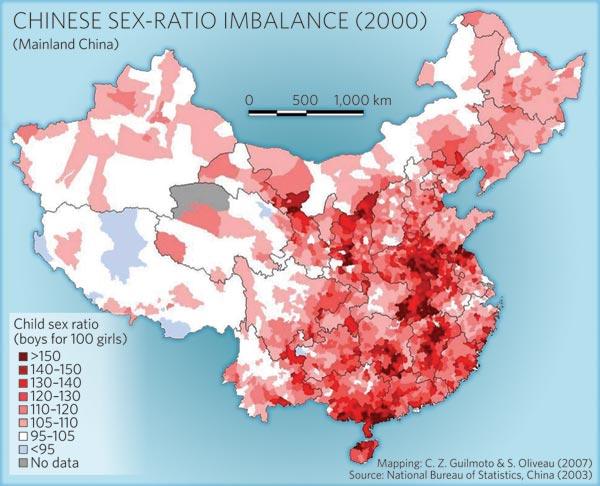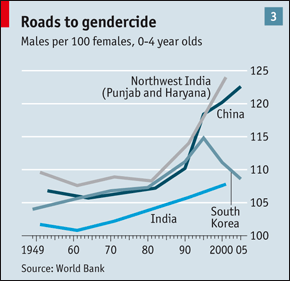Unbalanced Sex Ratio in China Posted by Stephen on Oct 17, 2011 in Culture
 In social experiments, intended outcomes often fall victim to unintended consequences. Such is the case with the the population control measures of China’s One Child Policy, which have been successful in curbing population growth, but at the expense of the a growing unbalanced sex ratio.
In social experiments, intended outcomes often fall victim to unintended consequences. Such is the case with the the population control measures of China’s One Child Policy, which have been successful in curbing population growth, but at the expense of the a growing unbalanced sex ratio.
As a consequence of the One Child Policy, sex-selection has been prevalent over the past 30 years and has drastically altered the demographic makeup of Chinese society. Now, there are just too many men and not enough women in the mainland.
Demography and population control has been a study of social scientists for the past century, but has yielded its most interesting findings over the past few decades, mainly in Asia. Due to the dense population of most Asian nations, population control and planned parenthood are not dirty words, and are widely accepted as necessary for society. If you’ve ever been to China, you know just how crowded it is, and immediately realize how impossible it would be if there were 2.1 children per every household.
But in Asia, it is not the population decline that has most people worried. It is the demographic decline and rising imbalance between male and female populations that have people worried. Demographic decline is synonymous with economic stagnation and debt accumulation, the social and cultural impacts of an unbalanced sex ratio can be equally devastating both in the immediate future and in the long-term.
Chinese society (as espoused by the Confucian Analects) has always been patriarchal society, valuing males over females. To be fair, this type of sex selection was not uncommon in other societies across the globe. Men could work fields and provide labor on farms. They controlled money and thus were responsible for looking after and paying for their parents/elders. So if you wanted a cushy retirement, you needed a bread-winning boy…or so the logic went. Fortunately, technology and medical practices couldn’t do much to guarantee that so the sex ratio never got out of hand.
But then modernity struck the mainland, and following the Open Door Policy, sex-selection once again became prevalent. As China embarked on a plan of economic prosperity, the One Child Policy ushered in a slew of government programs and medical treatments for the birth of one and only one child. Chinese citizens soon had the technology (ultrasounds, contraception, abortions) allowing them to control the sexual outcome of their child. Soon males were being born at an alarming rate.
Unfortunately, sex-selection social stigmas remained firmly planted in the minds of many, and the male preference continued over the past three decades (see chart above). As a result, a boom of baby males occurred as instances of sex-selective abortion, female infanticide and abandonment have sky-rocketed. If you’ve ever had a friend or family member adopt a Chinese orphan, what sex was it? I’d say 99 out of a 100 times, it’s a girl.
Since the 1980’s the male to female ratio of China has been climbing from the international standard 105:100. In 1982, the ratio was 108.5:100, in 1990 it was 111.3:100, in 2000 it was 116.9:100 and in 2010, it stood at a whopping 118.08:100 (Click here for article on growing sex ratio imbalances in China). That means in China there are only 82 women per every group of 100 men. That’s a lot of bros. Talk about a sausage party.
Now in a global context, this sex-selection has accounted for approximately 163 million lost women (over the past three generations) in the continent of Asia, and a surplus of males. For an great article on the ills of a male overstocked society, check out this MotherJones piece on Missing: 163 Million Women.
Basically it boils down to this: an overstock of males leads to increases in crime rates, unemployment and human rights abuses (such a sex trafficking, abuse and mail ordering brides), not to mention collapses in the economy. Usually surpluses are good, but in this case Asia is already at capacity. Trying to find a way to fit these males into society thus becomes a burden of the state and the economy. As anyone who’s been to a frat party will tell you, too many dudes in close proximity with few females present leads to destruction and chaos.
With a ratio so skewed toward males, finding a wife or spouse is becoming more and more difficult for men in Asia. As these numbers increase, a generation of bachelors will be doomed to their microwave dinners and nightly Poker meet-ups. While this is slowly becoming an issues for males in the mainland, expect it to lead to larger “social despair” issues in the coming decades, especially in already male flooded urban centers. After all, “to get rich is glorious”–unless you don’t have someone to spend your money with. It would be hard to sell the “Chinese Dream” without a notion of family if more urban dwellers took a look at the map below:
 The sex-selection practices and unbalanced sex ratio in the mainland need to be addressed immediately before the long-term problems of the One Child Policy rear their ugly heads. While population control is important for a country already at capacity, demographic control is even more pressing of a matter. Just with so many males and so few females, the question is how to get back to equilibrium without embarking on yet another sex-selective policy (I guess it would have to be female preferential?).
The sex-selection practices and unbalanced sex ratio in the mainland need to be addressed immediately before the long-term problems of the One Child Policy rear their ugly heads. While population control is important for a country already at capacity, demographic control is even more pressing of a matter. Just with so many males and so few females, the question is how to get back to equilibrium without embarking on yet another sex-selective policy (I guess it would have to be female preferential?).
So, to all you single, non-Chinese ladies out there, you may want to start looking for that special guy in the mainland. My advice is learn how to say “I love you” or 我爱你 in Chinese. The odds are in your favor.
Follow Steve on twitter: @seeitbelieveit

Build vocabulary, practice pronunciation, and more with Transparent Language Online. Available anytime, anywhere, on any device.
About the Author: Stephen
Writer and blogger for all things China related. Follow me on twitter: @seeitbelieveit -- My Background: Fluent Mandarin speaker with 3+ years working, living, studying and teaching throughout the mainland. Student of Kung Fu and avid photographer and documentarian.






Comments:
izabella:
Cheers!
Chinese woman: Say no to laowai:)! it’s a national agenda to keep you in the market…